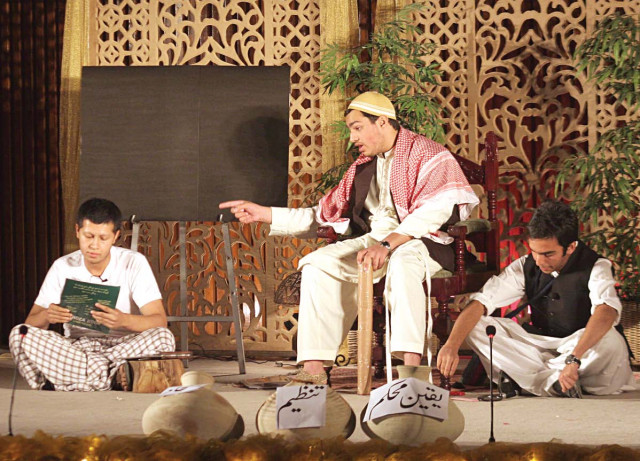National Child Rights Arts Festival: Centuries on, Anarkali’s suffering is still a current issue
Students choose socioeconomically relevant plays to entertain and educate.

National Child Rights Arts Festival: Centuries on, Anarkali’s suffering is still a current issue
A timeless tragedy that is the love story Anarkali was chosen by the presidents of student affairs at Schola Nova Islamabad, Sarah Hayat and Ahmed Kareem, for the European Union’s National Child Rights Arts Festival.
For those unfamiliar with it, the story is a stark commentary on class differences drawn by the elite, resulting in injustices against the protagonist.
The Schola Nova students thought that Anarkali’s socioeconomic commentary quite poignantly mirrored the second skit, Khwaja Moeenuddin’s Taleem-e-Balighaan, which focuses on Pakistan’s shambled sociopolitical situation.
Schola Nova’s academic head, Zubi Imran, commented that Taleem-e-Balighan was also chosen keeping the festival’s theme of education as the penultimate child right.
Anarkali, directed by Ahmed Karim and Umar Kashif was abridged to the focal scenes, such Emperor Akbar (Sheryar Shahid) and Queen Mumtaz’s (Sarah Hayat) disdain over Prince Salim’s intentions to marry the dancing girl, Anarkali (Anjali Dewani). Dil Araam’s (Mahim Zulfiqar) false narration of Anarkali’s character to Prince Salim’s parents, which further fueled their contempt, was also depicted.
The scene of Anarkali’s execution is shown through a dance performance by Anarkali and her chamber maids, Fiona Virjee, Farwal Harron and Amna Tajumal.
Taleem-e-Balighaan, directed by Sarah Hayat and Sharayar Shahid, proved a quick change in mood and pace from the dramatic tragedy.
It amused the audience with its wit and humour while raising very important issues of illiteracy, ineffective teaching and syllabi, the dwindling state of the motto of Pakistan (unity, discipline and faith) and the unshakable influence of the western world.
The cast included Saad Atiq as Molvi Sahib, giving a quirky and entertaining portrayal of the iconic character. The host of eccentric students were played by Umar Kashif as Kassai (butcher), Ahmed Karim as Hajam (hairdresser), Hamza Farrukh as Khan Sahab, Abdul Mateen as Dhobi (clothes washer), Muzammil Awaan as Gavala (milkman) and finally, Aadam Malik as Chaiwala (tea vendor). The cast had great comedic timing as well as banter full of chemistry and ease.
Contrasting the last two plays performed at the festival, these plays featured cast and crew from O’ and A’ levels which gave today’s events a different energy, as the earlier days focused on younger students.
However, the consistent theme of the importance of education has tied all days of the festival at the National Library together and will continue to entertain while simultaneously educating people about child rights.
Published in The Express Tribune, November 22nd, 2011.



















COMMENTS
Comments are moderated and generally will be posted if they are on-topic and not abusive.
For more information, please see our Comments FAQ